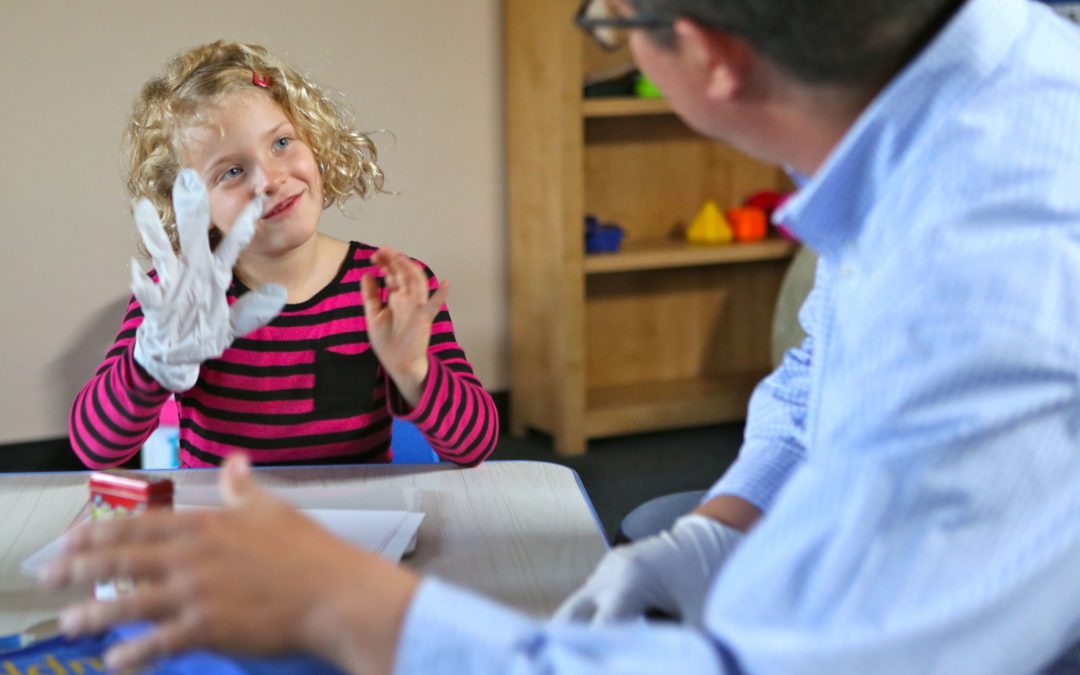Over the years, I’ve learned through experience and additional trainings, many lessons that I wasn’t exposed to in graduate school. The following 7 tips improved the effectiveness of my speech therapy.
- Focus on interaction before speech or language.
This tip may seem simple, but it is often overlooked. For children diagnosised with autism spectrum disorder and childhood apraxia of speech interaction can be especially important. Hanen-certified speech therapists recommend 3 non-verbal turns before targeting language. Hanen emphasizes interaction, because some children learn to request, but do not learn to initiate with frequency. Interaction is also important for children with Childhood Apraxia of Speech. Many times the goal is for the child with apraxia is have them make nonsense noises and babble. Look for activities that drive interaction and where the child is “noisy” and having fun. Then, build on those activities to develop speech and language skills.
2. Follow your child’s interest and lead.
Again. A no-brainer, right? But, giving a child options and letting them select the activity dramatically increases the number of turns you will get and the amount of time the child spends interacting with you and working on speech and language. Child-led therapy versus parent or clinician-led therapy is quite different. In my own experience providing therapy with children diagnoised with ASD I have seen twice as much participation with children when I join-in with an activity the child is choosing versus when I pick the activity.
3. Use face to face communication.
This simple strategy dramatically increases the likelihood that children with poor attention will tune-into you and your communication. It also teaches children with ASD and CAS to focus on the face and lips.
4. Harness the power of parents
Therapy that happens without home practice is only a fraction as effective as therapy that includes parents practicing the same strategies as the therapist. In a 2004 study, by Law, Garrett and Nye published in the Journal of Speech, Language and Hearing Research titled “The Efficacy of Treatment for Children with Developmental Speech and Language Delay/Disorder: A Meta-Analysis”, the authors found that “in terms of expressive vocabulary outcomes, there were no significant differences in measures of children’s vocabulary growth between interventions administered by trained parents and those administered by clinicians. “Parents as therapists” is a term to Google if you are looking for ideas on how parents can work on communication skills during their everyday routines. At Jenny’s we ask parents to and target a strategy 3-5 times a day during their daily routine.
5. Educate yourself online
Now days there are many free webinars and continuing education opportunities for parents and SLPs online. Some are good, some aren’t. But technology has definitely made online learning more accessible. Some of my favorites are our own free downloads as well as the leadersproject.org, Prentke Romich, Speechpathology.com and asha.org.
6. Motivate kids with many different activities.
Therapy has to be fun. Motivate children with many different options including play, crafts, games, songs, props, pretend play, physical play, video, audio recording, food and technology. (Musical app. Bubl Draw) As one parent said, “I don’t just want my child to sit in a chair all session long.”
7. Learn about Childhood Apraxia of Speech (CAS) and how to treat it.
It was as recently as 2007, that the American Speech-Language and Hearing Association (ASHA) drafted its official statement on Childhood Apraxia of Speech. In fact, I remember when I was in graduate school and we treated a child with a severe phonological delay that was most likely attributed to CAS, but we did not know it at the time. This past year Autism Speaks published a study that found that 65% of children with Autism Spectrum Disorder, ASD, also have Childhood Apraxia of Speech. That might seem high, but that figure fits with my experience. For parents wanting to learn more I recommend apraxia-kids.org and for SLPs wanting to earn continuing education credits, there is an excellent online course available on speechpathology.com –by Dr. Kim Allyn Farinella. (Course link)


Recent Comments